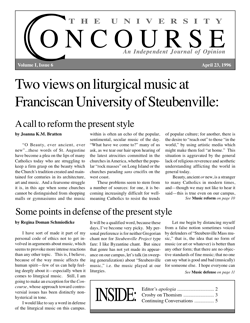Providentialism and rock music
by Alice von Hildebrand
Concerning NFP and “providentialism,” a brief remark: Just as we need to know the motivation of those who practice NFP before we criticize their actions, we also need to know the motivation of “providentialist” parents before we praise them too freely. Does their attitude toward family-planning flow from self-giving generosity? (in which case it cannot be praised highly enough); or is it triggered by the selfishness of husbands who are unwilling to make the slightest sacrifice for the sake of their wives, who might desperately need a break? I have known large families in which the wife was clearly at the very end of her strength, but her husband would not have dreamt of abstaining from what he considered his “right.” It is easy to convince oneself that one is obeying God’s law, when in fact, one is self-seeking. Omnis homo mendax. Or it can be a case of “mixed motivation,” (which my husband expounded so powerfully in his Moralia.) We can pass judgments on acts; God alone knows a person’s motivation.
Concerning rock music: God is not only beautiful; He is Beauty itself. The great artist is a “seer” (Plato) who has been granted a glimpse of this beauty and humbly tries to incarnate it in a work of art. Just as the philosopher is a lover of wisdom, the artist is a lover of beauty, and, thanks to the talent God has entrusted to him, he can capture a modest ray of His glory.
That the angelic music of Mozart speaks of a higher world of harmony and beauty is a given to anyone who has ears to hear. Cardinal Newman has expressed this mysterious truth in the following words: “they are outpourings of the eternal harmony in the medium of created sound; they are echoes of our home; they are the voice of angels, or the magnificat of the saints, or the living laws of divine governance, or divine attributes…” (OUS, XV)
It is noteworthy that Mark Fischer’s challenging defense of rock music hardly mentioned Beauty, which is the warp and woof of any authentic artistic creation. Is it because rock and roll’s powerful attraction stems, not from beauty, but rather from its “honesty” and its subjective “emotional power”? Then the word “art” definitely acquires a very different meaning.
My question is: can rock and roll—under whatever form—ever qualify to be called “the voice of the angels, the magnificat of the saints”? I personally doubt it.
Alice von Hildebrand, (retired) Professor Emeritus,Hunter College, New York
Dr. von Hildebrand is a trustee of FUS and widow of the Catholic philosopher Dietrich von Hildebrand.


